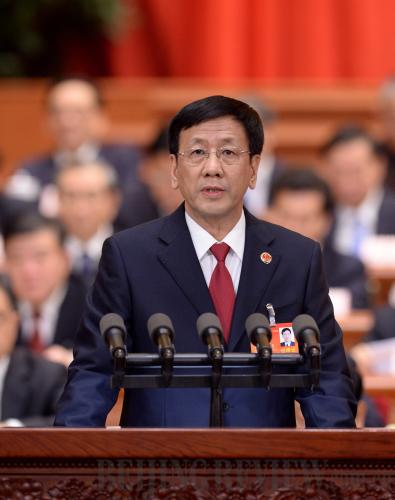|
 |
|
PROGRESS REPORT: Cao Jianming, Procurator General of the Supreme People's Procuratorate, delivers a work report to deputies of the National People's Congress on March 10 (WANG YE) |
According to Wu, currently punitive laws against corruption, such as the Criminal Law, the Criminal Procedure Law, the Civil Service Law and the Administrative Supervision Law, outnumber preventive laws. In the meantime, corruption prevention mainly relies on the internal rules of the CPC, such as the CPC Central Committee's eight-point rule on fighting bureaucracy and formalism and rejecting extravagance among Party members, as well as the regulations requiring officials to report personal affairs.
"The CPC's internal rules should be enacted into laws," Wu said. "Laws are legally binding and offenders will receive more severe penalties."
Practical measures
During this year's NPC session, deputies have put forward specific proposals on preventing, reporting and punishing corruption.
Cai Yi, Director General of the Hong Kong Island Federation, said that anti-corruption reporting through the Internet should be encouraged and corruption will be nipped in the bud through such efforts.
In his work report, Procurator General Cao also pledged to establish a corruption-reporting system based on letters, visits, phone calls and the Internet.
Wu said that while the Internet is an effective tool to report corruption, it should be used appropriately. "If an anti-corruption law can be enacted, it should include provisions on exposing corruption through the Internet," she said. For instance, Wu said that the law should specify the legal responsibilities of any person fabricating evidence and defaming others for corruption.
Chen Jingying, Dean of the Law School of Shanghai University of International Business and Economics, told Beijing Review that now many officials have been punished after being caught for corruption, in fact, preventive measures should be taken before their promotion, for instance, officials should be required to disclose their assets.
Hua Bei, deputy head of the Shanghai Administration of Supervision, said that various organizations should make coordinated efforts to fight against corruption, such as sharing banking and real estate information. "China should strengthen judicial cooperation with other countries in order to capture fleeing corrupt officials and recover stolen money or goods," she noted.
"International cooperation to prevent corruption is a strong deterrence. It tells corrupt officials that wherever you escape to, you will be caught eventually," Wu said.
Zhang Xuequn, President of the Yunnan Provincial Higher People's Court, said that while bribe takers should be severely punished, so should those paying the bribes.
Qiu Guanghe, Board Chairman of the Zhejiang Semir Group, a casual wear manufacturer, proposed increasing penalties to offenders committing commercial bribery and setting up a commercial bribery crime database and social credit system so as to promote the healthy and sustainable development of private businesses.
Dong Mingzhu, Chairwoman of Gree Electric Appliances, Inc. of Zhuhai in Guangdong, said that a business manager should always keep his or her bottom line in mind, and should not engage in under-the-counter deals with officials to maximize profit.
In addition to punishing bribers, anti-bribery rules should be updated to include new forms of bribing, said Chen Xu, the prosecutor from Shanghai.
"Previously, laws mainly address briberies in the form of money and goods, while leaving out those in the form of job offers, education financing, future transactions and even sex services," Chen Xu said. "These new forms of briberies should be added into relevant laws."
"Corruption is a natural enemy of the people's government," Premier Li said at the March 13 press conference, "We must put the exercise of power and the use of public money under institutional supervision."
Li said that the government will continue to streamline administration and delegate power, and it will release a list of activities that require government approval as soon as possible to set clear boundaries and ensure that power will not be abused.
Email us at: yaobin@bjreview.com | 